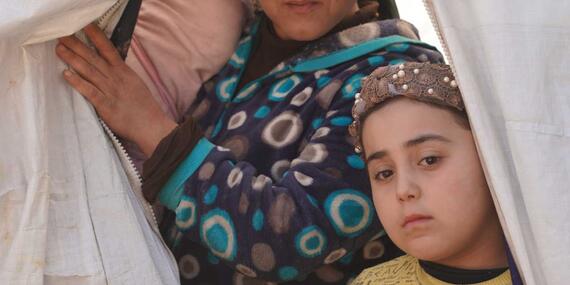Today's top news: Syria, Malawi, Riyadh Humanitarian Forum

Syria
The UN and our partners continue to scale-up cross-border aid operations from Türkiye to north-west Syria. Earlier today, 10 trucks carrying shelter and other items from International Organization for Migration crossed through Al-Ra’ee border crossing into northern Aleppo. This is the first UN convoy through the border crossing since the Government of Syria agreed to its use for aid deliveries.
At the same time, the World Food Programme sent 20 trucks through the Bab al-Hawa border crossing into Idleb province. This convoy is part of WFP’s larger earthquake response, which includes the delivery of food to 127,000 people in north-west Syria since the earthquake hit.
With these convoys, the UN has dispatched 227 trucks to north-west Syria since February 9th. Preparations are underway to send more trucks through all three border crossings.
At the same time, we and our partners continue to scale-up operations in other parts of Syria. Aid in the area of shelter remains a top priority, as thousands of affected people remain in collective shelters across Lattakia, Homs, Hama and Aleppo.
The UN High Commissioner for Refugees, UN Development Programme and UN Habitat are helping to conduct assessments of structural damage to buildings. These assessments will help determine whether families can return to homes that are deemed safe.
We are also trying to longer-term options for families who cannot return to their homes due to damage. Food and other aid are being distributed to families, including those who have returned to their homes.
Funding remains essential for the wider earthquake response—as of today, the Syria Flash Appeal is 17 per cent funded, with $68.5 million received towards the $329.1 million plan.
Malawi
The UN and our humanitarian partners are appealing for $45.3 million to assist 4 million people devastated by the country’s deadliest cholera outbreak in recent history. This funding will support the Government-led response over the next five months.
The Flash Appeal aims to help the people most at risk and hardest hit by the outbreak – through health, water and sanitation, nutrition, education and protection services.
The number of cholera cases and deaths in Malawi has increased exponentially since the start of the year, with nearly 1,450 fatalities and 45,000 cases having been recorded. The outbreak has affected all 29 districts of the country since March of last year. The start of the rainy season in November caused the disease to spread significantly.
We and our humanitarian partners have been supporting oral cholera vaccination campaigns and patient care. We have also delivered vital medical supplies and deployed experts to assist in the response. However, more resources are urgently needed to scale up the response to the outbreak, which health experts say could lead to between 64,000 and 100,000 additional cases over the next three months.
Riyadh Humanitarian Forum
Under-Secretary-General for Humanitarian Affairs and Emergency Relief Coordinator Martin Griffiths told the 3rd Riyadh Humanitarian Forum today that humanitarian action alone cannot address the emergencies the world is facing right now.
Speaking on behalf of the Secretary-General at a panel discussion, co-organized by OCHA , Mr. Griffiths urged the global community to work together and use political will to stop conflict, address the climate crisis, fight famines and be prepared for the next emergency around the corner.
The Forum is organized by the King Salman Humanitarian Aid and Relief Center or KSRelief, every two years in Riyadh. Attended by humanitarian leaders, donors, practitioners, researchers and others, the Forum promotes dialogue on humanitarian aid-related issues and also seeks practical solutions in line with international humanitarian law and achieving the Sustainable Development Goals.
